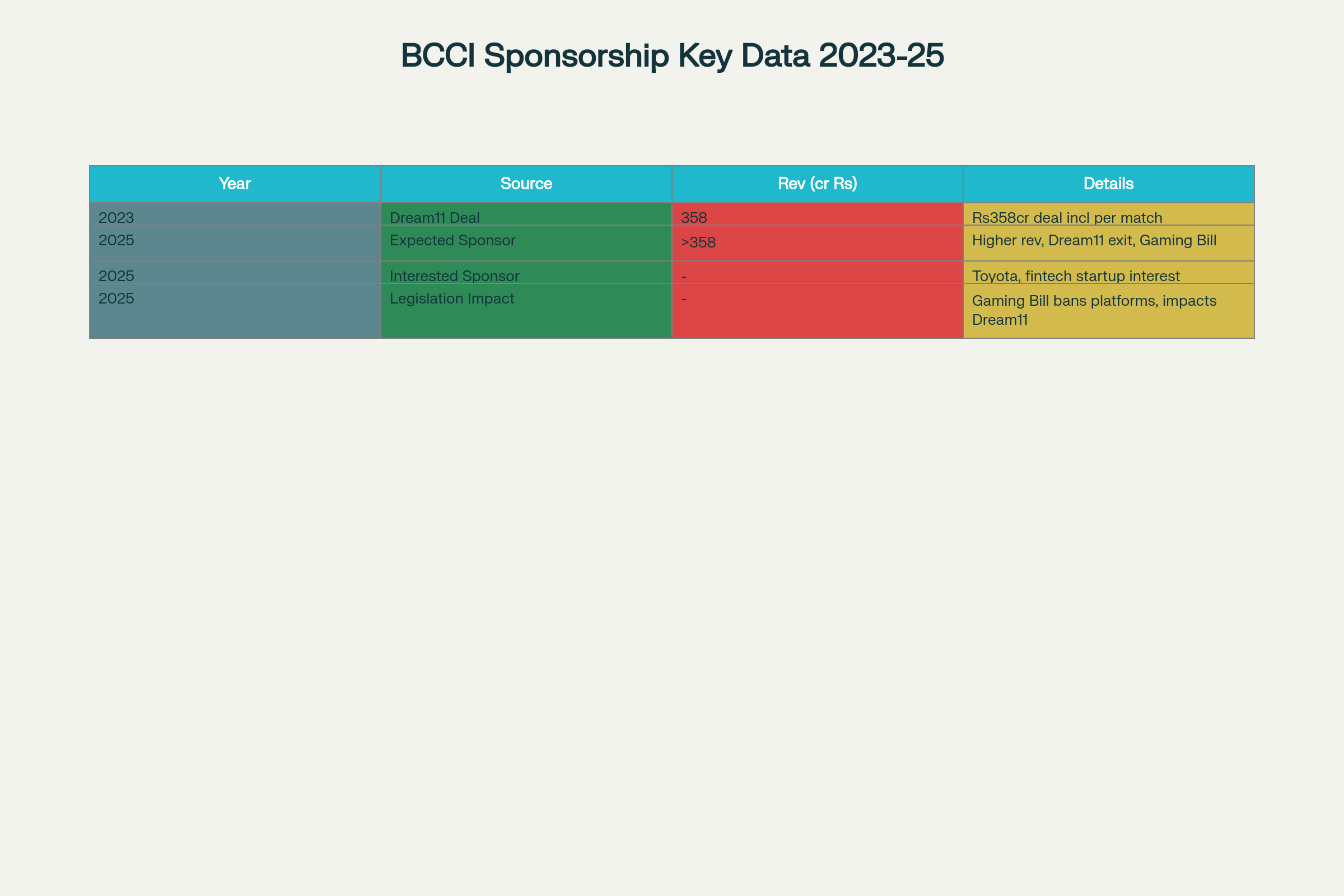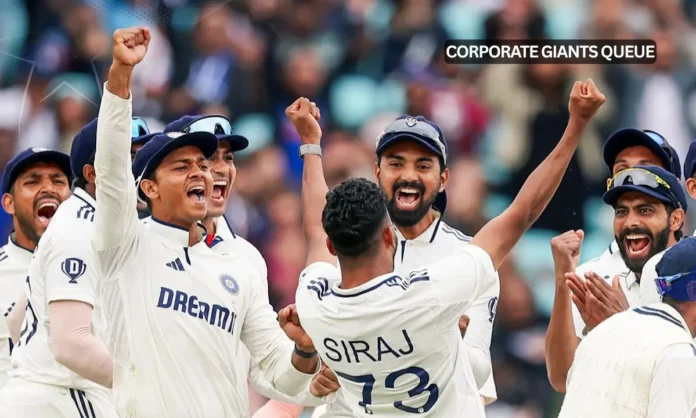Key Highlights:
- Toyota Motor Corporation and fintech startup show formal interest in team India title sponsorship
- BCCI expects higher revenue than previous Rs 358 crore Dream11 deal following regulatory changes
- 2025 Online Gaming Bill prohibits real-money gaming platforms, ending fantasy sports partnerships
The BCCI faces a lucrative opportunity as major corporations queue up to secure the team India title sponsorship after Dream11’s abrupt departure from the team’s premier sponsorship deal. With the Asia Cup 2025 set to begin on September 9, the board’s search for a new partner has attracted significant interest from industry leaders, potentially reshaping the commercial landscape of team India title sponsorship for years to come. The Promotion and Regulation of Online Gaming Act, 2025, which received presidential assent on August 22, has created an unprecedented vacuum in the team India title sponsorship portfolio, opening doors for traditional corporate giants to re-enter cricket’s most coveted marketing platform.
Corporate Giants Position for Premium Cricket Partnership
- Toyota Motor Corporation emerges as frontrunner among interested parties seeking team India title sponsorship
- Unnamed fintech startup demonstrates serious intent to secure cricket’s premier marketing platform
The exodus of fantasy gaming platforms from Indian cricket has triggered intense corporate interest in the team India title sponsorship rights. Toyota Motor Corporation has formally expressed interest in the partnership, marking the automotive giant’s potential return to cricket after years of focusing on other sports properties. A fintech startup has also entered preliminary discussions with BCCI officials, though the company’s identity remains undisclosed pending formal tendering processes for the team India title sponsorship.
Sources close to the BCCI reveal that while only two companies have formally approached the board for the team India title sponsorship, several other multinational corporations are evaluating the sponsorship opportunity. The departure of Dream11 has effectively ended the dominance of fantasy sports platforms in cricket sponsorship, creating space for traditional industries to reclaim premium sports marketing territories through the team India title sponsorship. Toyota’s interest is particularly significant given the company’s global sports marketing strategy and extensive automotive market presence in India.

The timing of corporate interest coincides perfectly with the Asia Cup 2025 schedule, offering immediate visibility for any new team India title sponsorship across the tournament’s extensive television and digital coverage. However, BCCI secretary Devajit Saikia confirmed that the board will not compromise on legal compliance, stating that the organization will strictly follow all government policies regarding team India title sponsorship partnerships.
Regulatory Framework Reshapes Sports Sponsorship Landscape
- Parliament passes comprehensive Online Gaming Act 2025 affecting real-money gaming platforms
- New legislation establishes National Online Gaming Commission for industry oversight
The Promotion and Regulation of Online Gaming Act, 2025, has fundamentally altered India’s sports sponsorship ecosystem by prohibiting online money games and their associated marketing activities. The legislation, which passed both houses of Parliament on August 20-21, 2025, specifically targets games involving monetary stakes, regardless of skill or chance elements, effectively eliminating fantasy sports platforms from mainstream advertising opportunities including team India title sponsorship.
The Act establishes the National Online Gaming Commission (NOGC) as the primary regulatory authority, empowering it to license platforms and classify games into permissible skill-based categories or prohibited chance-based activities. Under the new framework, only licensed platforms can advertise or conduct prize-based competitions, while unlicensed operations face significant penalties including fines and imprisonment, directly impacting their ability to pursue team India title sponsorship.
For sports sponsorship, the legislation creates clear distinctions between acceptable e-sports platforms and prohibited fantasy gaming services. E-sports platforms that meet specific criteria including recognition under the National Sports Governance Act, 2025, and involve organized competitive events without betting elements, remain eligible for team India title sponsorship opportunities. However, platforms like Dream11 that operate real-money fantasy competitions fall under the prohibited category, forcing their immediate withdrawal from sports partnerships including the team India title sponsorship.
The regulatory change extends beyond cricket, affecting multiple sports properties that previously relied on fantasy gaming sponsorships. BCCI officials estimate that Dream11 and similar platforms contributed approximately Rs 1,000 crore annually across various cricket sponsorship deals, highlighting the significant revenue restructuring required across Indian sports beyond just the team India title sponsorship.
BCCI Revenue Expectations Exceed Previous Benchmarks
| Year | Sponsorship Source | Revenue (crore Rs) | Key Details |
|---|---|---|---|
| 2023 | Dream11 | 358 | Rs 3 crore per home match, Rs 1 crore per away match |
| 2025 | Expected New Sponsors | More than 358 | Toyota and fintech startup interest, higher revenue expected |
| 2025 | Legislation Impact | – | Online Gaming Bill bans real money gaming platforms |
The BCCI’s confidence in securing enhanced team India title sponsorship revenue stems from multiple factors reshaping the sports marketing landscape following the gaming industry’s regulatory restrictions. Dream11’s three-year partnership, signed in 2023, included Rs 3 crore per home match and Rs 1 crore per away game, totaling Rs 358 crore over the contract period. Board officials now expect significantly higher valuations for the team India title sponsorship due to reduced competition among traditional corporate sponsors and increased demand for premium sports marketing properties.
The departure of fantasy gaming platforms has effectively concentrated corporate interest among fewer, more established companies capable of meeting BCCI’s elevated revenue expectations for the team India title sponsorship. Toyota’s expressed interest signals the automotive industry’s recognition of cricket’s marketing value, particularly given India’s expanding automotive market and cricket’s unmatched audience reach. Similarly, fintech companies view the team India title sponsorship as essential for brand building in India’s rapidly digitalizing financial services sector.
BCCI’s strategic approach involves leveraging the timing of Dream11’s departure to maximize commercial opportunities for the team India title sponsorship. The board has chosen not to rush into immediate partnerships, instead allowing corporate interest to build ahead of the formal tendering process. This approach mirrors successful sponsorship strategies employed by other major cricket boards, where extended bidding periods typically result in premium valuations for premier sponsorship properties like the team India title sponsorship.
The revenue projections also factor in cricket’s expanding digital audience, with streaming platforms contributing significantly to overall viewership metrics. Disney+ Hotstar and JioCinema’s substantial investments in cricket broadcasting rights have created additional value propositions for the team India title sponsorship, justifying higher partnership fees beyond traditional television advertising rates.
Asia Cup Timeline Creates Urgency for Partnership Decisions
- Tournament begins September 9 with potential for Team India to compete without title sponsor
- Pre-printed Dream11 jerseys will not be used despite Asia Cup proximity
The compressed timeline between Dream11’s departure and the Asia Cup 2025 start date creates unprecedented urgency for BCCI’s team India title sponsorship decisions. With the tournament scheduled to begin on September 9 in the UAE, spanning Dubai and Abu Dhabi venues until the September 28 final, the board faces logistical challenges in securing, announcing, and implementing new team India title sponsorship arrangements.
BCCI officials confirmed that Team India’s Asia Cup jerseys featuring Dream11 branding have already been manufactured but will not be used for the tournament, necessitating rapid production of new team apparel. This decision demonstrates the board’s commitment to regulatory compliance despite significant logistical and financial implications associated with uniform changes at such short notice for the team India title sponsorship transition.
The tournament’s significance extends beyond immediate commercial considerations, as the Asia Cup serves as crucial preparation for upcoming ICC events and bilateral series. Any new team India title sponsorship will benefit from extensive media coverage across the tournament’s 20-day duration, offering substantial brand visibility across cricket’s key markets including India, Pakistan, Sri Lanka, and Bangladesh.
If BCCI cannot finalize team India title sponsorship agreements before September 9, Team India will compete without a title sponsor for the first time in recent memory, potentially impacting broadcast presentation and commercial revenue generation. However, board officials remain optimistic about securing partnerships given the strong corporate interest expressed by Toyota and other companies evaluating the team India title sponsorship opportunity.
Closing Assessment
The convergence of regulatory changes and corporate interest positions BCCI for a transformative team India title sponsorship era that could redefine cricket’s commercial partnerships beyond fantasy gaming platforms. Toyota’s formal interest alongside unnamed fintech companies signals traditional industries’ recognition of cricket’s enduring marketing value, particularly as legislative changes eliminate digital gaming competition from premium sports properties like the team India title sponsorship. The board’s strategic patience in pursuing enhanced revenue targets, despite Asia Cup timeline pressures, demonstrates confidence in cricket’s fundamental commercial appeal across diverse corporate sectors seeking the team India title sponsorship.
This team India title sponsorship transition represents more than simple partner replacement; it marks cricket’s return to traditional corporate partnerships that dominated sports marketing before fantasy gaming’s rise. The BCCI’s ability to secure partnership terms exceeding Dream11’s Rs 358 crore deal will establish important precedents for sports sponsorship valuations in post-gaming regulation India, potentially influencing partnership structures across multiple sports properties for years ahead through the success of the team India title sponsorship model.


